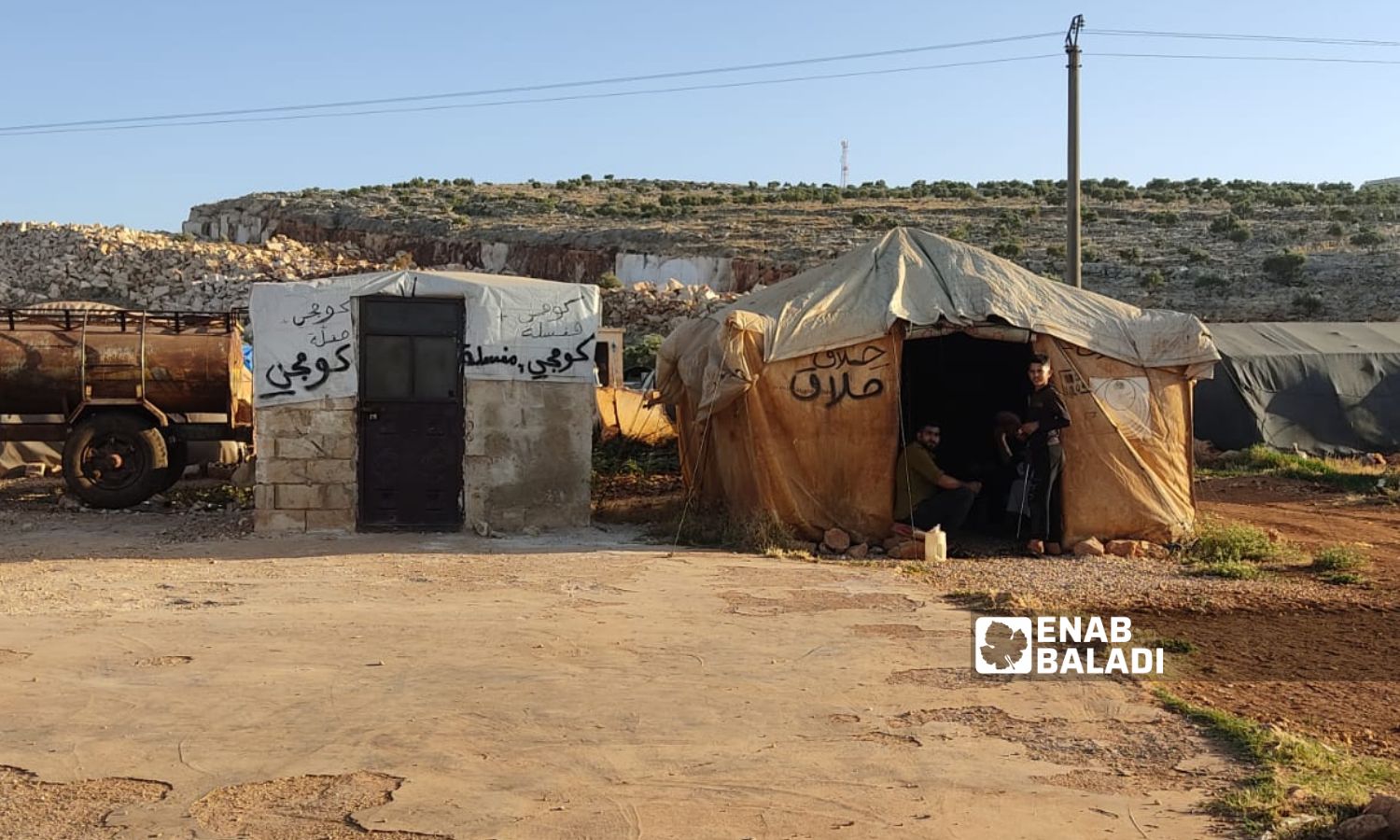



Idlib – Iyad Abdul Jawad
Some of the displaced have turned their tents into alternative shops through which they obtain their daily sustenance as a result of the living conditions in the northwestern regions of Syria, which imposed a new form of economic life for some of the population.
And also as a result of the inability of a number of displaced people to open shops and stores to provide the services they excel in, given that the lowest rental cost is $50.
There are no shops built in the camps, given that they consist of tents altogether, which means that renting a shop requires moving to work in the city of Idlib or a village.
Mohamad Abdul Majid, 58, who resides in al-Sikkah camp near the village of Kafr Banna, explained to Enab Baladi that working inside the camp in a car and motorcycle maintenance workshop is not very popular.
Abdul Majid said that his work does not cause inconvenience to the neighbors, but at the same time, he does not have an alternative source of income, and therefore he must secure his livelihood despite the hardships of living, he added, referring to the deterioration of the living situation.
He continued, “I worked before in the maintenance of bicycles and cars, and after displacement, I returned to this profession forcibly.”
Abdul Majid cannot rent a shop outside the camp due to the lack of money. He also left everything he owned behind when he was displaced, and he could barely secure the family’s daily sustenance. These reasons prompted him to work in a tent.
He believes that owning a store or shop changes the situation and allows the person to place goods in the store. When a customer comes who wants to maintain his bike in the summer, the man does not feel enthusiastic about providing his services due to the high temperatures inside the tent.
There are other professions whose workers are fed up with shop rents, so they tend to settle their work in a small tent, which deprives the profession of many of its requirements, and they dispense with it under the weight of necessity.
Ahmad al-Mohamad al-Hussein, a displaced person from the village of al-Bawabiya in the southern countryside of Aleppo, also turned his tent into a small store where he sells foodstuffs, as he does not have another profession through which he supports 20 family members, including his sons and the sons of his widowed daughter.
Ahmed al-Talib, director of al-Khair camp in the northern countryside of Idlib, told Enab Baladi that these tent shops are not organized and random, in addition to their proximity to villages where there are stores and places for shopping, in light of the inability of the displaced to invest and do business of this kind.
Difficult living conditions also prompted Fayez al-Mousa, from the village of Islameen in the countryside of Saraqib, to maintain electrical appliances in a tent in al-Khair camp near the town of Harbanoush to support his family of eight.
Al-Mousa confirmed to Enab Baladi that the shop is a better option, but the rents exceed his financial capabilities, so he resorted to the tent and used it as his headquarters for his work, and the capabilities of the people are weak, and they need to be taken into account.
When there is a rented shop, and the obligations and expenses involved, the maintenance fee will necessarily vary, and it will rise for the customer, but when working in the tent, whatever the wage he gets, he does not feel the loss, according to al-Mousa.
“Living is difficult, capabilities are limited, we hardly live,” he says, adding that the tools he works with are simple, and he also suffers from a problem in providing electric power to test the tools that are suitable for people, in addition to the difficulty of staying in a tent that does not protect against climatic factors throughout the year.
The residents of the camps in the northwestern regions of Syria have been suffering for years from a shortage of securing many of their needs, on top of which are foodstuffs, which are common needs with the camps that emerged in response to the February 6 earthquake.
The needs of the camps are also increasing in exchange for the increasing inability of local and international organizations and the lack of support.
The United Nations Office for the Coordination of Humanitarian Affairs (OCHA) said in 2022 that 4.6 million people in northwestern Syria need humanitarian assistance, including 3.3 million people who are suffering from food insecurity and 2.9 million people are internally displaced persons.
The number of people in need of humanitarian assistance rose to 14.6 million people, an increase of 1.2 million people compared to 2021, and this number is expected to reach 15.3 million people in 2023.
According to the statistics of the Syrian Response Coordination Group (SRCG) released last March, the number of people who live under the poverty line in northern Syria increased to 89.24%, while the percentage of families that reached the point of hunger increased to 39.64%.
if you think the article contain wrong information or you have additional details Send Correction